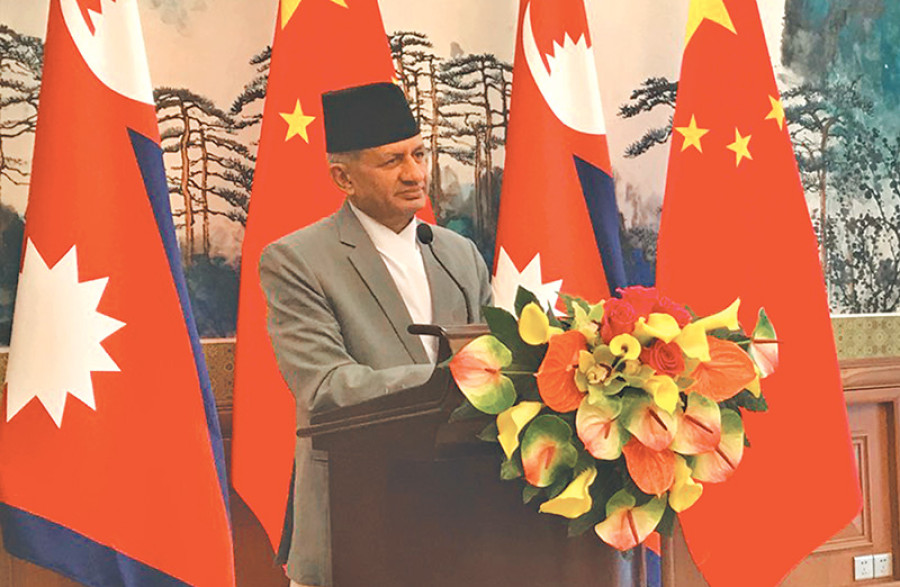National
In China, FM Gyawali outlines five areas of cooperation
Foreign Minister Pradeep Gyawali has said Nepal counts on Chinese support and cooperation for realising its national development aspirations.
Anuj Kumar Adhikari
Foreign Minister Pradeep Gyawali has said Nepal counts on Chinese support and cooperation for realising its national development aspirations.
Gyawali, who is on a five-day visit to China, outlined five interlocking areas where Nepal and China can work together for spurring economic growth in the smaller neighbour. At a roundtable organised by the China Reform Forum in Beijing on Wednesday, he emphasised partnership with China.
Transport and connectivity; agriculture, industries and technology transfer; unlocking human potential; natural resources and environment; and trade and investment are the five core areas where Nepal and China can work together, said Gyawali. Connecting China through rail, road, power, telecommunication and airways was the top priority of the Nepal government.
Minister Gyawali reiterated an agreement reached with his Chinese counterpart Wang Yi on Wednesday on developing trans-Himalayan multi-dimensional transport network with a long-term vision to reducing infrastructural deficiencies that have constrained the potentials of trade, commerce and people-to-people contacts between the two neighbours.
At the roundtable, Gyawali hailed China’s prompt assistance in the immediate aftermath of the devastating earthquake of 2015. He recalled a Chinese proverb gesturing that China is a genuine friend of Nepal. “Only when the year grows cold do we see that the pine and cypress are the last to fade; only when we get into trouble do we know who our genuine friends are,” said Gyawali, translating the Chinese proverb.
He also praised China’s assistance to Nepal in any “natural or man-made” crisis and consistent support to Nepal’s sovereignty and non-interference in the country’s internal affairs. “As Nepal moves towards graduating from the LDC [least developed country] status by 2022 and acquiring a middle income status by 2030, we need to move with great speed and vision. A comprehensive economic partnership between Nepal and China will help achieve these goals quickly and sustainably,” Gyawali said at the event.
On Wednesday, Gyawali also addressed a Nepal-China sales mission—a tourism promotion programme organised jointly by the Embassy of Nepal, Nepal Tourism Board, and the Nepal Association of Tour and Travel Agents. Gyawali said Nepal should continue promotional activities in various parts of the world, but more so in the immediate neighbourhood where there is a huge market yet to be tapped.
He noted that Chinese tourists visit Nepal in small numbers while total outbound Chinese tourists stood at more than 130 million in 2017. “Mass marketing strategies should be utilised to attract greater attention. I hope and wish that concerned organisations are working on that,” said Gyawali. Last year, 104,664 Chinese toured Nepal.
On cooperation in the international forum, Gyawali said the government and people of Nepal have always stood with China in times of need. “One China policy and not allowing anti-Chinese activities on our soil forms the core of our friendship with China.
“Nepal takes pride in seeing China’s growing profile on the world stage, both politically and economically. China’s role is very important in shaping global agenda for a just and equitable world order.
“We strongly believe that Nepal-China friendship will always be in the interest of our two countries and people. Territorial size, population and level of development have never been the elements of constraint in defining Nepal-China friendship. Rather, sovereign equality and mutual respect have always remained at the centre, buttressing our cooperative partnership,” the foreign minister said.
After concluding his programmes in the Chinese capital, Gyawali left for Chengdu where he is scheduled to meet provincial leaders and deliver a speech at Sichuan University.
Common Concerns for Nepal, China
- Transport and connectivity: Connectivity will have transformative impact on development in Nepal in pursuit of economic growth and social progress
- Agriculture, industries and technology transfer: Dissemination of Chinese agricultural technologies and mechanisation in order to improve productivity and efficiency
- Unlocking human potential: Nepal has relatively young, economically active and agile population with 60 percent people between 15 to 60 years of age
- Natural resources and environment: Tourism, hydropower, medicinal herbs and forest resources
- Trade and investment: There are several areas under Belt and Road Initiative in the fields of trade, commerce and investment which hold great promise for Chinese cooperation with Nepal




 9.51°C Kathmandu
9.51°C Kathmandu














